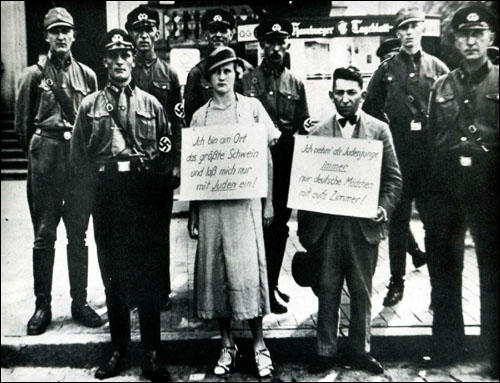Nuremberg Laws
Once in power Adolf Hitler began to openly express anti-Semitic ideas. Based on his readings of how blacks were denied civil rights in the southern states in America, Hitler attempted to make life so unpleasant for Jews in Germany that they would emigrate. The campaign started on 1st April, 1933, when a one-day boycott of Jewish-owned shops took place. Members of the Sturm Abteilung (SA) picketed the shops to ensure the boycott was successful.
The hostility of towards Jews increased in Germany. This was reflected in the decision by many shops and restaurants not to serve the Jewish population. Placards saying "Jews not admitted" and "Jews enter this place at their own risk" began to appear all over Germany. In some parts of the country Jews were banned from public parks, swimming-pools and public transport.

Jews and Gentiles in Hamburg. The woman's sign says: "At this place I am the greatest
swine for I laid with a Jew" The man's sign says: As a Jewish youth I always take
only German girls to my room"
Germans were also encouraged not to use Jewish doctors and lawyers. Jewish civil servants, teachers and those employed by the mass media were sacked. Members of the SA put pressure on people not to buy goods produced by Jewish companies. For example, the Ullstein Press, the largest publisher of newspapers, books and magazines in Germany, was forced to sell the company to the NSDAP in 1934 after the actions of the SA had made it impossible for them to make a profit.
Many Jewish people who could no longer earn a living left the country. The number of Jews emigrating increased after the passing of the Nuremberg Laws on Citizenship and Race in 1935. Under this new law Jews could no longer be citizens of Germany. It was also made illegal for Jews to marry Aryans.
Primary Sources
(1) Law for the Protection of German Blood and German Honour (15th September, 1935)
Imbued with the insight that the purity of German blood is prerequisite for the continued existence of the German people and inspired by the inflexible will to ensure the existence of the German nation for all times, the Reichstag has unanimously adopted the following law, which is hereby promulgated:
(1) Marriages between Jews and subjects of German or kindred blood are forbidden. Marriages nevertheless concluded are invalid, even if concluded abroad to circumvent this law.
(2) Only the state attorney may initiate the annulment suit.
Extramarital intercourse between Jews and subjects of German or kindred blood is forbidden.
Jews must not employ in their households female subjects of German or kindred blood who are under forty-five years old.
(1) Jews are forbidden to fly the Reich and national flag and to display the Reich colors.
(2) They are, on the other hand, allowed to display the Jewish colors. The exercise of this right enjoys the protection of the state.
(2) Statement issued by the National Representation of the Jews in Germany in response to the passing of the Nuremberg Laws (24th September, 1935)
The laws decided upon by the Reichstag in Nuremberg have come as the heaviest of blows for the Jews in Germany. But they must create a basis on which a tolerable relationship becomes possible between the German and the Jewish people. The National Representation of the Jews in Germany is willing to contribute to this end with all its powers. A precondition for such a tolerable relationship is the hope that the Jews and the Jewish communities of Germany will be enabled to keep a moral and economic means of existence by the halting of defamation and boycott.
The most urgent tasks for the National Representation of the Jews in Germany, which it will press energetically and with full commitment, following the avenues it has previously taken, are:
1. Our own Jewish educational system must serve to prepare the youth to become upright Jews, secure in their faith, who will draw the strength to face the onerous demands which life will make on them from conscious solidarity with the Jewish community, from work for the Jewish present and faith in the Jewish future. In addition to transmitting knowledge, the Jewish schools must also serve in the systematic preparation for future occupations. With regard to preparation for emigration, particularly to Palestine, emphasis will be placed on guidance toward manual work and the study of the Hebrew language. The education and vocational training of girls must be directed to preparing them to carry out their responsibilities as upholders of the family and mothers of the next generation. An independent cultures structure must offer possibilities of employment to Jews who are artistically and culturally creative, and serve the separate cultural life of the Jews in Germany.
2. The increased need for emigration will be served by large-scale planning, firstly with respect to Palestine, but also to all other available countries, with particular attention to young people. This includes study of additional possibilities for emigration, training in professions suited for emigrants, particularly agriculture and technical skills; the creation of ways and means to mobilize and liquidate the property of persons who are economically independent; the broadening of existing means of transferring property and the creation of additional such means.
3. Support and care of the needy, sick or aged must be assured through further systematic expansion of the Jewish welfare services provided by the communities to supplement government social services.
4. An impoverished community cannot carry out these varied and difficult tasks. The National Representation of the Jews in Germany will try by every means to safeguard the economic position of the Jews by seeking to protect the existing means of livelihood. Those who are economically weak will be assisted by the further development of economic aids as employment bureaus, economic advice, and personal or mortgage loans.

